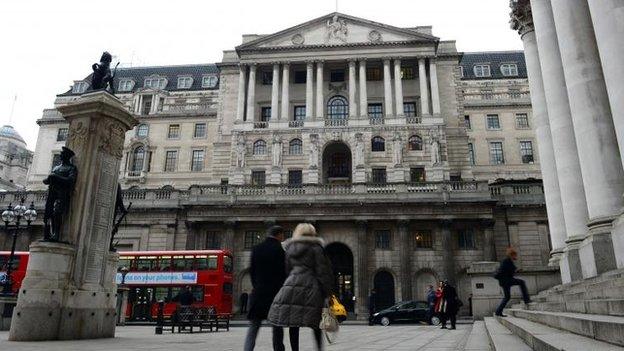Co-op Bank fails stress test and Lloyds and RBS remain at risk in 'severe economic downturn'
- Published
- comments

The Bank of England's doomsday economic scenario has left three of Britain's major banks under some stress.
But only one, Co-op, has actually failed the test of what would happen if there were an economic crisis in the UK.
The bank, which faced its own crisis in 2012 when its efforts to buy 600 Lloyds Bank branches collapsed, has been told to cut its balance sheet by selling assets.
For Lloyds and RBS the results of the stress tests were tough but not as gloomy.
Although the Bank of England said that both "remain susceptible to a severe economic downturn", they were already taking action to strengthen their businesses.
The Bank has not demanded that either bank submit a revised capital plan, unlike Co-op.
The overall message of the stress test is that banks and building societies are stronger than they were in 2013 when the last test was taken.
And certainly much better than in the crisis of 2008.
Five other firms - HSBC, Barclays, Nationwide, Santander and Standard Chartered - passed the stress test.
The Bank did say that many banks faced "misconduct risk" in the future - the huge fines for issues such as the manipulation of the foreign exchange market and the mis-selling of Payment Protection Insurance (PPI).
The Bank war-gamed a scenario where the UK economy would face a crisis not seen since World War One.
Under the test, house prices would collapse by 35%, unemployment would surge by 12%, interest and inflation rates would rise and financial markets would collapse by 30%.
That would put banks' and building societies' businesses under pressure and leave them with losses of £13bn.
Lloyds and RBS, with a large amount of mortgage lending, would be particularly exposed.
Mark Carney, the governor of the Bank of England, said: "This was a demanding test.
"The results show that the core of the banking system is significantly more resilient [and] that it has strength to continue to serve the real economy even in a severe stress."
The Bank has made it clear that its doomsday scenario is not something that it thinks is likely to happen at the moment.
It is an attempt to replicate the bad news piled upon bad news such as occurred in 2008.
And given that the present risks in the economy include a collapse in the oil price and possible deflation in the eurozone, some argue that the Bank is testing the wrong thing.
The Financial Stability Report, also published by the Bank today, does warn that the global economic outlook has weakened since June.
The report admits that geo-political risk and weak global growth could "affect the outlook for financial stability".
And debt levels for consumers in the UK mortgage market "remain high".
That given, the economic headwinds are still considerable.
Banks and building societies will have to keep strengthening their balance sheets to be able to withstand them.